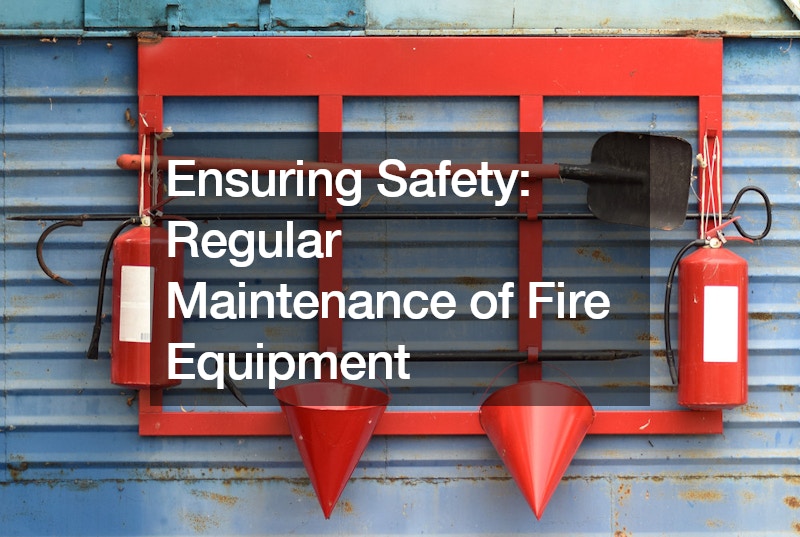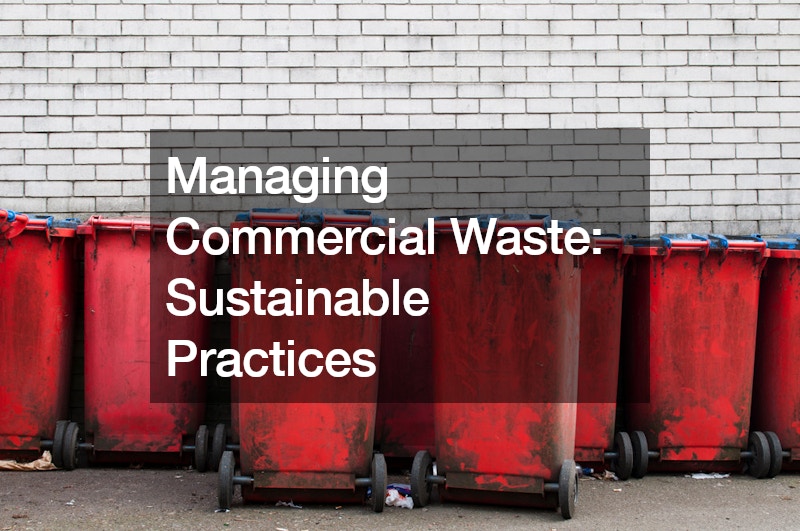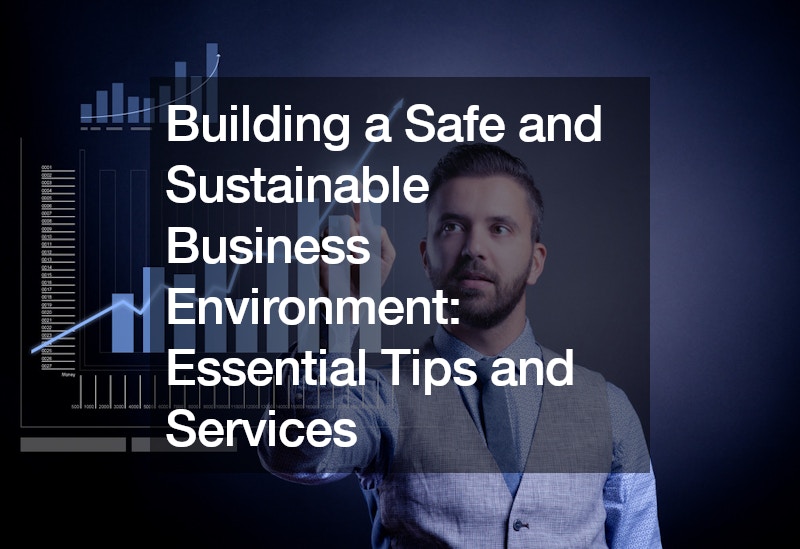The importance of creating a safe and sustainable business environment cannot be overstated. Successfully managing a business entails more than just increasing profits; it requires a balanced approach to sustainability and safety. This article provides an in-depth look at key services and strategies essential for the holistic development of a business environment that is both safe and sustainable. The growing trend towards integrating sustainability and safety in business operations underscores the relevance of these practices today.
Maintaining Outdoor Spaces: The Role of Efficient Irrigation

Well-maintained outdoor spaces significantly enhance the aesthetic appeal of a business, leaving a positive impression on clients and visitors. A pristine exterior can reflect a business’s values and dedication to quality. Implementing a commercial lawn irrigation system is vital in maintaining the lush greenery that contributes to a business’s visual appeal.
Automated and efficient irrigation systems provide clear benefits for sustainability. These systems incorporate water conservation techniques that ensure minimal waste while maintaining the health of plants. Cost savings are another significant advantage, as reduced water usage directly translates to lower utility bills.
When choosing the right commercial lawn irrigation system, consider the specific needs of your business’s landscape. Regular maintenance checks are essential to ensure the system functions efficiently and effectively. Furthermore, incorporating native plants can drastically reduce water needs, promoting both sustainability and resilience.
Handling Difficult Tenants: Legal Support and Processes
Dealing with problematic commercial tenants can be one of the most challenging aspects of property management. These challenges can range from late payments to disruptive behavior, all of which can affect your business operations. Seeking the assistance of a commercial tenant eviction attorney can help navigate these issues legally and efficiently.
A commercial tenant eviction attorney specializes in handling disputes between landlords and tenants. They offer the necessary legal support to ensure that the eviction process is carried out smoothly and in strict adherence to the law. Understanding the legal rights and processes for both parties can prevent further complications and foster fair resolutions.
To choose a reliable commercial tenant eviction attorney, look for experience and a proven track record in similar cases. Taking preventive steps before eviction becomes necessary can also mitigate potential issues. Documenting tenant issues thoroughly and maintaining clear communication can often resolve problems without resorting to legal action.
Ensuring Safety: Regular Maintenance of Fire Equipment

Fire safety is an essential component of a secure business environment. The presence of fire equipment such as extinguishers, alarms, and sprinklers plays a crucial role in protecting lives and property. Regular fire equipment maintenance ensures these systems remain operational and effective in the event of an emergency.
Different types of fire equipment require varied methods and frequencies of maintenance. For example, fire extinguishers need to be inspected monthly, while alarm systems should undergo annual testing. Knowing the specifics of each type of equipment is vital to maintaining comprehensive fire safety protocols.
Actionable steps to enhance fire safety include scheduling regular inspections and maintenance of all fire equipment. Training employees on fire safety procedures ensures they know how to act quickly and effectively during an emergency. Keeping updated records of all maintenance activities provides a clear timeline and history of safety measures.
Optimizing Space: Effective Storage Solutions

Effective commercial storage solutions are vital for improving operational efficiency. An organized storage system ensures that materials and products are easy to find, reducing downtime and streamlining business processes. Investing in quality storage solutions can thus have a direct impact on productivity and profitability.
Various types of commercial storage solutions are available, ranging from shelves and cabinets to larger warehouse systems. The choice of storage depends on the specific needs of your business, including the volume of goods and the frequency of access. Identifying the best storage option is a key aspect of space optimization.
Actionable steps include conducting a comprehensive storage audit to assess current and future needs. Implementing a robust inventory management system helps track and manage stock levels effectively. Regularly reviewing and updating storage solutions ensures they continue to meet the evolving demands of the business.
Ensuring Operational Continuity: Reliable Fuel Services
A steady fuel supply is crucial for businesses reliant on machinery, vehicles, or generators. Interruptions in fuel availability can disrupt operations and result in significant financial losses. Reliable commercial fuel services help mitigate these risks by ensuring continuous supply.
Various types of commercial fuel services are available to meet diverse business needs. Whether you require bulk fuel delivery, on-site fueling, or emergency fuel supply, selecting the right service provider is critical. Evaluating factors such as reliability, pricing, and delivery options can aid in making an informed decision.
Setting up a regular fuel delivery schedule can help maintain consistent operations. Implementing fuel usage monitoring systems allows for better tracking and management, reducing waste and costs. Compliance with environmental regulations ensures that fuel usage aligns with sustainability goals.
Building for the Future: Sustainable Design Practices

Sustainable building designs offer numerous benefits for modern businesses. These designs prioritize energy efficiency, resource conservation, and reduced environmental impact. Businesses adopting sustainable practices can lower operating costs and enhance their corporate social responsibility profile.
Key principles of sustainable architecture include the use of energy-efficient systems and the selection of sustainable materials. Embracing renewable energy sources, such as solar power, further reduces carbon footprints. Examples of sustainable building practices include green roofs, natural lighting, and rainwater harvesting systems.
Actionable tips to implement sustainable building designs include conducting an energy audit to identify areas of improvement. Investing in energy-efficient lighting and appliances can result in substantial long-term savings. Exploring the use of renewable energy, where feasible, can also provide clean, cost-effective power.
Protecting Your Business: Comprehensive Security Measures

Robust security systems are essential to protect business assets, employees, and data. From surveillance cameras to access control systems, a comprehensive security strategy covers physical and cyber threats. Business security is a critical aspect of business management services that ensures operational integrity.
Integrating various types of security measures provides layered protection. Combining physical security, such as alarm systems, with cyber security protocols safeguards both tangible and digital assets. Employing a multi-layered approach helps in addressing potential vulnerabilities more effectively.
Actionable tips for enhancing business security include conducting a thorough security assessment to identify gaps. Implementing multi-layered security systems offers comprehensive protection. Regularly training employees on security protocols fosters a culture of vigilance and preparedness.
Navigating Legal Challenges: The Role of Business Lawyers
Businesses often face complex legal challenges that require expert navigation. Issues such as contract disputes, regulatory compliance, and intellectual property rights can have significant implications. Engaging a knowledgeable business attorney helps in addressing these issues proactively.
A business attorney provides essential support in drafting and reviewing contracts, ensuring they are legally sound and reflective of business interests. They also assist in navigating compliance requirements across local, state, and federal levels. Regular legal consultations help in mitigating risks and ensuring that business operations align with legal frameworks.
Choosing the right business attorney involves considering their expertise and experience in relevant areas. Keeping all business contracts and legal documents updated is crucial for legal preparedness. Ensuring that the business complies with all applicable regulations helps prevent potential legal setbacks.
Enhancing Brand Visibility: The Impact of Custom Signs

Custom business signs play a pivotal role in enhancing brand visibility and attracting customers. Well-designed signs serve as a visual representation of a brand’s identity and values. Investing in quality custom signs can significantly boost a business’s market presence.
Various types of custom signs, including outdoor, indoor, and digital signs, cater to different marketing needs. Outdoor signs capture the attention of passersby, while indoor signs enhance the customer experience within the premises. Digital signs offer dynamic messaging options that can be easily updated.
To create effective custom signs, it is advisable to work with professional sign designers who understand branding and design principles. Ensuring that signs comply with local regulations is also important to avoid legal issues. Regularly updating signs keeps the branding fresh and aligns with current marketing strategies.
Promoting Employee Well-being: Ergonomic Office Solutions
Employee well-being is a crucial aspect of business management services. Investing in ergonomic office seating and workstations promotes health, comfort, and productivity. Ergonomically designed furniture reduces the risk of injury and enhances overall job satisfaction.
Key features of ergonomic chairs include adjustable seat heights, lumbar support, and flexible armrests. Workstations designed for ergonomic efficiency allow for proper posture and movement. Assessing and improving office ergonomics can yield tangible benefits in employee performance and morale.
Conducting an ergonomic assessment of the office helps identify areas that need improvement. Investing in high-quality ergonomic furniture is a wise long-term investment in employee health. Educating employees on ergonomics and proper posture can further optimize the benefits of ergonomic solutions.
Managing Commercial Waste: Sustainable Practices

Proper waste management is crucial for maintaining a clean and sustainable business environment. Implementing sustainable waste management practices can significantly reduce a business’s environmental footprint. This includes reducing waste generation, recycling, and disposing of waste responsibly.
Commercial waste management services offer various solutions to handle waste efficiently. These services help businesses segregate waste, implement recycling programs, and comply with waste disposal regulations. Sustainable waste management practices not only benefit the environment but also enhance a business’s reputation.
Actionable tips include conducting a waste audit to identify areas for improvement, implementing a comprehensive recycling program, and educating employees about sustainable waste management practices. Regularly reviewing and updating waste management practices ensures ongoing compliance and sustainability.
Enhancing Employee Productivity: Smart Office Design
A well-designed office environment can significantly enhance employee productivity and satisfaction. Smart office design involves creating a workspace that supports efficiency, collaboration, and well-being. This includes optimizing the layout, lighting, and amenities to create a conducive work environment.
Investing in modern office furniture and technology can improve the overall functionality of the workspace. Ergonomic workstations, comfortable seating, and advanced communication tools can enhance employee performance. Incorporating elements such as natural light, plants, and break areas can also improve the office atmosphere.
Actionable tips include conducting a workspace analysis to identify areas for improvement, investing in ergonomic furniture and technology, and creating designated areas for different activities such as collaboration, quiet work, and relaxation. Regularly updating the office design ensures it continues to meet the needs of the workforce.
Utilizing Renewable Energy: Powering Sustainability

Transitioning to renewable energy sources is a significant step towards achieving sustainability. Renewable energy, such as solar, wind, and hydro power, reduces reliance on fossil fuels and lowers greenhouse gas emissions. Implementing renewable energy solutions can also lead to substantial cost savings over time.
Installing solar panels is a popular and effective method for businesses to harness renewable energy. Wind turbines and hydroelectric systems are other viable options depending on the business’s location and energy needs. Evaluating the feasibility and potential benefits of these solutions is crucial for making an informed decision.
Actionable tips for integrating renewable energy include conducting an energy audit to determine current usage, exploring available incentives and rebates for renewable energy installations, and partnering with reputable renewable energy providers. Regularly reviewing energy consumption and adjusting systems ensures optimal performance and sustainability.
Streamlining Operations: Implementing Technology Solutions
Technology solutions play a critical role in streamlining business operations and enhancing efficiency. From project management software to automated systems, technology can simplify tasks, reduce errors, and improve productivity. Staying updated with the latest technological advancements ensures a competitive edge.
Various technology solutions, such as cloud computing, artificial intelligence, and the Internet of Things (IoT), offer unique benefits for businesses. Implementing these solutions can improve data management, enhance customer experiences, and optimize supply chain operations.
Actionable tips for integrating technology solutions include assessing current processes to identify areas for improvement, investing in training programs to ensure employees are proficient with new technologies, and staying informed about emerging trends. Regularly updating and maintaining technology systems ensures they remain effective and secure.
In conclusion, creating a safe and sustainable business environment is vital for long-term success. Implementing the discussed services and strategies can lead to significant improvements in business operations, safety, and sustainability. These practices not only enhance business growth but also contribute to employee well-being and overall company reputation.
Business management services play a pivotal role in ensuring that all aspects of operation align with the goals of safety and sustainability. The integration of these principles fosters a resilient and adaptable business environment. Long-term benefits include enhanced efficiency, cost savings, and a positive corporate image.
Encouraging businesses to adopt these practices can lead to widespread improvements in industry standards. By prioritizing safety, sustainability, and employee well-being, businesses can navigate the future with confidence and responsibility. This comprehensive approach ensures a balanced and thriving business landscape.
This detailed article ensures that all aspects of building a safe and sustainable business environment are covered, providing specific, actionable advice to business owners.

